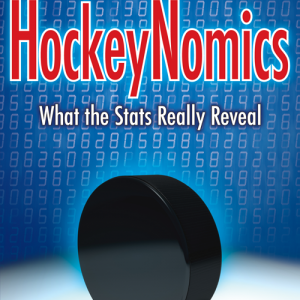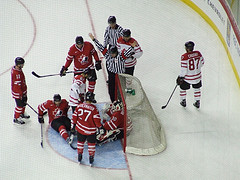Amazon Link (Affiliate Link, THW gets a small commission)
Amazon Link (non-Affiliate link)
First there was Freakonomics. Then there was Super Freakonomics. Now there’s HockeyNomics! Economics (“the science of dealing with the allocation of scarce resources) has now invaded hockey.
Has author Darcy Norman discovered an e=mc2 like equation that uncovers all the secrets that a casual read of the commonly presented hockey statistics does not reveal?

Not exactly – but Norman delves into the world of hockey statistics like no hockey book has done before. It is an interesting spin and thought-provoking dissection of hockey numbers. He attempts to take hockey fans to a place similar to where the much acclaimed Moneyball: The Art of Winning an Unfair Game took baseball fans.
HockeyNomics explores various questions not just based on opinion, but based on unique statistical analysis. In the process, the reader is often left to draw his own conclusion from the data presented. In each exploration, however, Norman has achieved what I believe to be his main goal – to challenge the reader to think outside the box and realize the daily box scores and scoring leaders far from tell us the whole story.
Here are just some of the hockey stats adventures Norman takes the reader on:

*99’s 92 goal season – Best Ever?
*Is all-time shutout leader Marty Brodeur overrated?
*Will Ovy8 or SC87 have the better career?
*Which NHL teams are best at the draft?
{Spoiler Alert: The following italicized text reveals some of the conclusions author Darcy Norman arrives at.}
Admittedly, I would intensely debate some of the conclusions that the respective stats analysis reveal, but Norman leaves it open to interpretation and recognizes some of the limitations based on the current stats and metrics available. Here are just a few quick counterpoints I would explore further:
*Gretzky’s 92 goal season was about more than just the goals. He also notched 120 assists for 212 points. In Brett Hull’s 86 goal season, he mustered 45 assists, which makes for a pretty decent Cy Young eligible season. The Great One’s 92 goal season is still superior in my opinion.
*Martin Brodeur overrated? Yes – you read this correctly. No – I am far from convinced. The Devils have been a very good team for quite a long time. Marty has kept on being Marty surviving several coaches and the exodus of blueliners such as Scott Stevens, Scott Niedermayer and Brian Rafalski, as well as new era of hockey post-lockout with the subsequent decrease in clutching and grabbing. He is one of the best puckhandling goaltenders to ever have played the game and the NHL created a rule later deemed the “Brodeur Rule” mainly because of him. In terms of durability and the ability to perform under pressure, Brodeur is among the all-time elite in all of sports.
The reader is also introduced to some of the trailblazers in the hockey analysis field:
*Alan Ryder writes for the Globe and Mail and has his own website – Hockey Analytics.
*Iain Fyffe writes on the web site Puck Prospectus.
*Chris Boersma has his own website Hockey Numbers.
*Gabriel Desjardins has his own website Behind The Net.
Through work of these above stats men Norman introduces the reader to intriguing metrics, stats and models such as Goals Created, Kinda Goals Created Against, Shot Quality Neutral Save Percentage, and Player Contribution.
It was a fast, but intriguing read. I have also dusted off a place in my hockey library where HockeyNomics will reside as a reference, since there are various sections I will definitely want to re-read. Not simply a book geared towards the hockey nut, Norman explains the numbers games thoroughly yet on an easily understandable level that even the casual hockey fan would enjoy, appreciate and left craving more.
Rating: 8/10
I don’t think that there is a better tip I can give – especially if readers are finding this type of work new and interesting – than hitting the blogosphere. My book provides an introduction, but the real work is being done on the front lines. The internet is ideal for this type of discourse.
Be it the guys I mention in the book (Boersma, Ryder, Fyffe), the great work over at Puck Prospectus or Gabe Dejardins’ “Behind the Net” website (which offers a ton of unique statistics, free to use), there are some great sites doing analysis. I’ve been lucky enough to have relocated to Edmonton, where sites like mc79hockey, the Copper and Blue as well as Vic Ferrari and friends (Irreverent Oilers Fans) write about the home team from a statistical analysis slant. I’m sure there are plenty of similar sites supporting other NHL clubs.
Once a fan has the basics down, I think there’s a veritable treasure trove of work being done, just outside of the mainstream. It’s up to us to discover and discuss.
Thanks again for the kind words,
-Darcy Norman
PS:
As for the 8/10 rating, it is not some developed metric I have come up with to measure a book’s greatness or weakness…lol…
FYI: I am not easily impressed, but really impressed with this piece of work. The 8/10 resemble that while i think it is a really good final product, I am looking forward to even more arguments being analyzed in this fashion, more developed metrics or metrics and stats that are more refined. As well, I’m looking forward to more books on this subject matter!
Thanks Darcy for the detailed comment and further defending some of the issues I brought up. You do a sound job in the book and I definitely see where you are coming from.
I really enjoyed reading and learning about some of the relatively new stats, metrics and systems out there that dig deeper into the heart of hockey numbers, and trying to quantify stuff that we previously had no way of putting numbers to it.
As you emphasize, the fluid nature of hockey makes things difficult, but the work of the guys mentioned show us that nothing is impossible.
I look future to more of their work and definitely more of your work! Any hints for readers on upcoming current or potential projects?
Cheers,
-Chris
Thanks for the review, glad you enjoyed the book.
It seems I’m destined to eat some crow with regards to Brodeur. I say this as I watch him diligently go to work for the Devils as they dismantle the rest of the conference. And my serving may get bigger; it’s hard to predict a preciptitous decline in his future performance. Brodeur is also likely to be his dependable self next month, backstopping the Canadian team to gold in Vancouver, bolstering his position amongst hockey fans.
You bring up a great point about Brodeur’s puck-handling ability, something I was obviously aware of but neglected in the book. Before I dig into the feather-laden feast, however, let’s see if I can’t “lawyer” your point into support of my argument:
The purpose of the essay – and the book, as you correctly note – is to introduce fans to some concepts beyond the box score. That chapter in particular focuses on the work of Alan Ryder (and later Ken Krzywicki) on shot quality neutral save percentage. With regards to that statistic and other classical measurements of a goaltender’s ability, I think the argument of his being overrated is sound; there are circumstances outside of his control that have inflated Brodeur’s (and many other goaltenders’) statistics. If you buy into the logic of SQNSV%, then by defintion Brodeur is rated too high relative to some of his peers.
Of course, also important to looking beyond the box score is, well, looking beyond the box score. That involves putting a value on things that are difficult to measure or derive from the newspaper. This is where Brodeur shines. You’ve got his tremendous puck-handling ability that forced the league to rewrite the rule book, as you mention. There’s also his amazing durability and consistency. This can’t be understated; it’s incredibly beneficial to players, coaches and management to play in front of, design a system around and build a team based on the predictible performance of a goaltender. The Devils encapsulate that idea.
I think it’s sometimes difficult for the average fan to grasp the notion that it is acceptable to be completely average (or worse) in some facets of the game, while exceptional in others. But when you add up the relative strengths and weaknesses here, you get a great goaltender, which Brodeur most certainly is. He only becomes overrated when he’s attributed with skills that the numbers don’t support.
There. Hopefully that’ll save some face for the time being. That is until Brodeur stands on his head next month, then continues on his way, annihilating the NHL record book.
Love the blog. Cheers,
-Darcy Norman